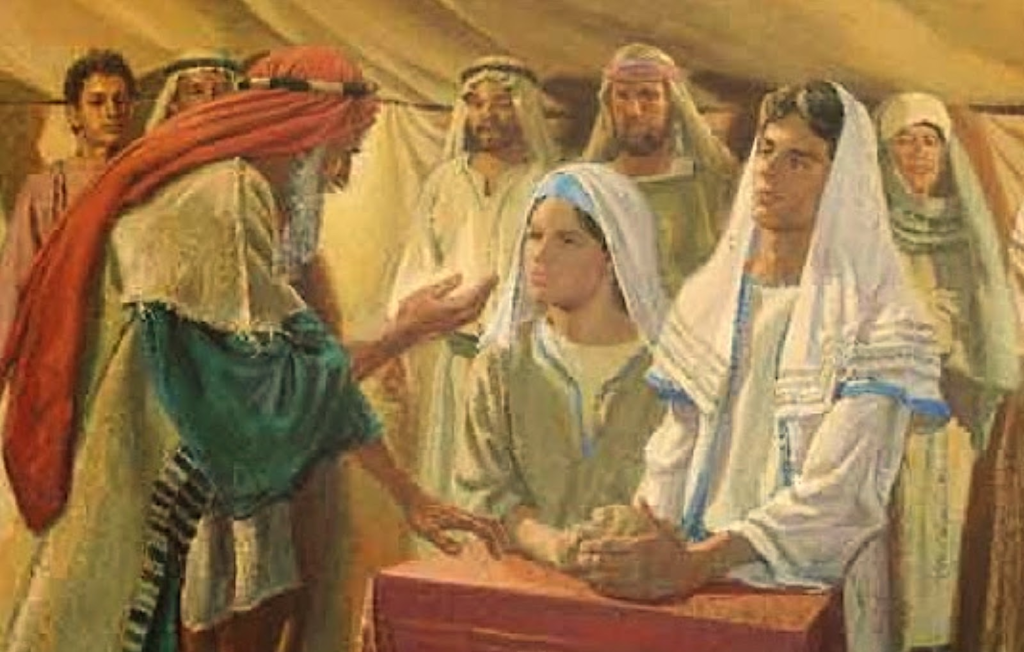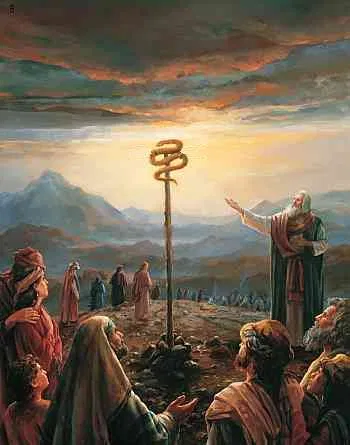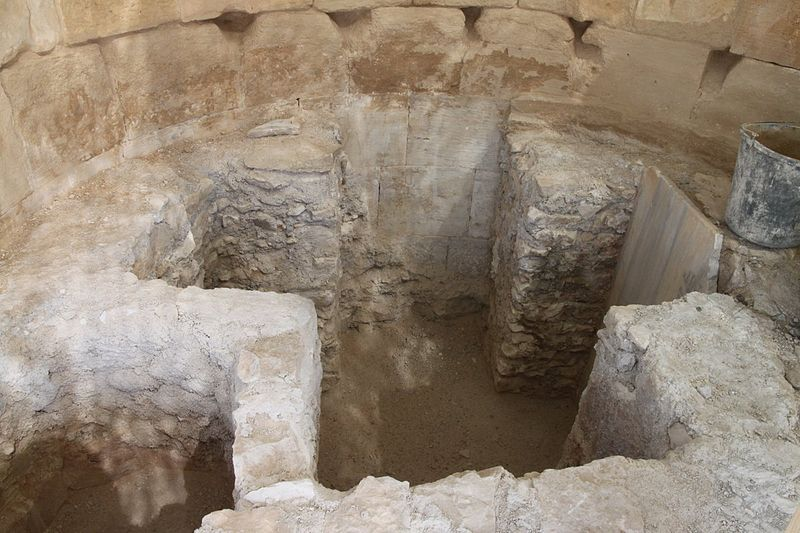For the week of January 29-February 4
In addition to reading the indicated chapters from 1 Nephi this week, you may enjoy:
- Reading the corresponding material from the Book of Mormon Institute Student Manual at
- Exploring the additional resources at Book of Mormon Central at Come Follow Me 2024: 1 Nephi 16–22 | Book of Mormon Central
- Watching any or all of the following videos:
If you would like a Kahoot game related to this material which you could use for personal study or use with your family or your class, click here: https://create.kahoot.it/share/1-nephi-16-22/2a032ab9-3005-43b5-bf40-400cdc7adb13. (To use it with a group, after clicking on this link, you will need to log into Kahoot, creating a free account if you have not done so previously, then click on the blue “Start” button. Some of the Kahoot questions may presuppose that the player has read through the suggested answers to the following Points to Ponder as well as the recommended readings from the Institute Student Manual.
Points to Ponder for 1 Nephi 16-22
Note: Consider the following a menu of questions from which you can choose. No one should feel obligated to try to eat everything on the menu in one meal!
1. Nephi tells us “the guilty taketh the truth to be hard, for it cutteth them to the very center.” (16:2) When teaching those whose lives are out of harmony with church teachings, do you feel it would usually be wisest to (a) soft‑pedal the gospel at first and ease gradually into the question of such standards as chastity, the Word of Wisdom, and tithing, or (b) boldly and unmistakably proclaim the truth and let the chips fall where they may? Why do you think so?
2. In 1 Ne. 16:7-8 Nephi suggests that it is a “commandment” to get married. Why? Should single people consider themselves commandment breakers?

3. The story of the Liahona must appear a little far‑fetched to the skeptics. What can you say in defense of its plausibility? Of what was it symbolic? (16:10.)

4. How disappointed are you in Lehi in 16:20, where after years of faithfulness he, too, begins to murmur against the Lord? Explain your answer.
5. After he had broken his bow and made another, why did Nephi, who so often asked the Lord directly for personal revelation, instead ask his father where he should go to hunt game? What underlying principle which is taught here? Where could you apply it? (16:23.)

6. How does Nephi’s response to the Lord’s command to build a ship differ from that you think the average person would have made? (17:8-11)

7. Why would the idea of building a ship have so incensed Laman and Lemuel? (17:17-18)
8. What modern parallels do you see to the brass serpent of Moses’ time, which was such a simple cure for snakebite that many wouldn’t even try it? (17:41)

9. What do we learn in chapter 17 about why the Lord chose the Jews as his people? Are they still his people by those criteria? Is the Lord siding with Israel in its current Middle Eastern conflicts? (17:34-35.)
10. What do we learn from 17:45 about the nature of revelation?
11. Shouldn’t someone full of the Spirit have more, not less, physical strength? Explain 17:47, then.
12. Why do you suppose Nephi customarily climbed a mountain to pray? (18:3) What would be the reasonable equivalent for us?

13. Why is Nephi so critical of his brothers for their singing and dancing? Aren’t those appropriate enough activities? (18:9.)

14. What is wrong with the following statement? “Nephi wrote his record of sacred matters on the small plates and recorded secular matters on the large plates.” (19:3-6.)
15. Why does 1 Nephi 19:10 say that “God … himself” would be crucified? Wasn’t it the Son of God?
16. What is wrong with the following statement? “Because the Jews crucified the Savior, the Lord has punished and scourged them for nearly 2000 years.”
17. In 19:23 Nephi declares his intention in quoting from Isaiah to be to persuade his brethren to believe in “the Lord their Redeemer.” What do these Isaiah chapters even have to do with Jesus?
18. In 19:24 Nephi suggests we liken scripture unto ourselves. If we literally applied all instructions in scripture to ourselves, however, wouldn’t we all end up building an ark as we read Genesis, stoning sabbath breakers as we read Numbers, and making the typical Protestant mistake of considering the Savior’s great commission of Mark 16:15‑26 as constituting a call to the ministry and a grant of authority to all who read it? What is the practical application of Nephi’s words?
19. In what way could the Isaiah chapters of the Book of Mormon be compared to a diamond mine? [Hint: What is found most plentifully in diamond mines? It isn’t diamonds!] What “diamonds” can you find in 1 Nephi 20 and 21? Why do you consider each a “diamond”?

20. How would you respond to the charge that the phrase “or out of the waters of baptism” (1 Ne. 20:1) was not in the 1830 edition of the Book of Mormon but was an afterthought of Joseph Smith, who tried to make it appear that baptism had been practiced in Old Testament times?

21. Compare 1 Ne. 21:1 with Isaiah 49:1. How do you account for the difference?
22. What aspect of Isaiah 49 do our Jewish friends generally seem to have forgotten?
23. What is meant by the temporal scattering and gathering of Israel? What is their spiritual scattering and gathering? Which is going on today? Which is the more significant? (1 Ne. 22:3.)
24. When Nephi repeatedly emphasizes (1 Ne. 22) that “the righteous need not fear,” do you take that to signify that the righteous will receive divine protection or that even if they don’t, they shouldn’t worry about it?
25. What are you aware of in these chapters which no one was aware of in Joseph Smith’s day and which provides circumstantial evidence for the authenticity of the Book of Mormon?
26. What do you think are the other most important “principles” or “lessons” Nephi wanted us to learn from these seven chapters?
Possible Answers to Points to Ponder in 1 Nephi 16-22
1. Nephi tells us “the guilty taketh the truth to be hard, for it cutteth them to the very center.” (16:2) When teaching those whose lives are out of harmony with church teachings, do you feel it would usually be wisest to (a) soft‑pedal the gospel at first and ease gradually into the question of such standards as chastity, the Word of Wisdom, and tithing, or (b) boldly and unmistakably proclaim the truth and let the chips fall where they may? Why do you think so?
In general, it may be helpful to establish a rapport before calling the person to repentance, but at some point we may need to be sufficiently direct that they do not misunderstand us. I’m impressed that prophets in the scriptures could seldom be accused of being so wishy-washy or timid as to not be understood. I think we often are too hesitant and soft-spoken to be of much help to those to whom we minister or otherwise have responsibility for. On the other hand, there is no need to be like a bull in a china shop. People are usually more motivated by love than by chastisement.
2. In 1 Ne. 16:7-8 Nephi suggests that it is a “commandment” to get married. Why? Should single people consider themselves commandment breakers?
Only in marriage can one learn the lessons of love, unselfishness, longsuffering, etc., that one needs to grow toward perfection. Only in marriage can one properly participate with the Lord in bringing children into the world. And only in marriage can one find the greatest happiness one can enjoy either in this life or the next, and commandments are given to help us be happy! Some Church leaders have expressed concern that too many are postponing or avoiding marriage with its attendant challenges and opportunities. Naturally, those who are doing their best to qualify to be a good marriage partner but who haven’t yet had the opportunity should not consider themselves any any way derelict.
3. The story of the Liahona must appear a little far‑fetched to the skeptics. What can you say in defense of its plausibility? Of what was it symbolic?
Is it any more far-fetched than the cloud by day and the pillar by night that guided ancient Israel? Or any other miracle? Hugh Nibley gives an interesting discussion of ancient legendary parallels to the Liahona in his Since Cumorah, pp. 283-296. As Alma 37:45 points out, the Liahona was symbolic of the words of Christ, most specifically as they come through inspiration.
4. How disappointed are you in Lehi in 16:20, where after years of faithfulness he, too, begins to murmur against the Lord? Explain your answer.
Who, other than the Savior, didn’t display human weaknesses at one time or another? Certainly Moses, Elijah, Peter, James and John, Paul, and others whom we revere as Biblical greats all had their recorded moments of weakness. Let’s remember all of them for their greatness, not for their weaknesses.
5. After he had broken his bow and made another, why did Nephi, who so often asked the Lord directly for personal revelation, instead ask his father where he should go to hunt game? What underlying principle which is taught here? Where could you apply it? (16:23.)
Nephi at this point might have been tempted to stage a “spiritual coup.” He was obviously the most steadfast and spiritual of the group. He could have gone to the Lord directly. But he saw this as an opportunity to build his dad up, honor him, and motivate him to become again the spiritual giant he had been. There is a great human relations principle at work here. Goethe said something on the subject. To paraphrase him: Treat a man as he is, and he will remain as he is. Treat him as he can and ought to be and he will become what he ought to be. We might more easily reactivate a person today by treating him as a valuable resource whom we need in the Church rather than as a lost soul which we have come to call to repentance. This principle can be applied in the home, at work, in leadership in the Church, and virtually anywhere else.
6. How does Nephi’s response to the Lord’s command to build a ship differ from that you think the average person would have made? (17:8-11)
Many would have protested that they didn’t know how to build ships, or didn’t have any tools, or that it would be too much work. Nephi doesn’t protest at all and doesn’t ask any more of the Lord than is necessary. Rather than ask for tools or anything else that he couldn’t take care of himself, he asks simply for help in finding the ore from which he could smelt the metal with which he could make the necessary tools.
7. Why would the idea of building a ship have so incensed Laman and Lemuel?
Laman and Lemuel were so happy to finally be out of the desert, having reached a land which could justly be called “Bountiful,” that the idea of leaving this apparent “promised land” to venture onto the uncharted seas in a homemade boat must have seemed nothing short of lunacy.
8. What modern parallels do you see to the brass serpent of Moses’ time, which was such a simple cure for snakebite that many wouldn’t even try it?
So many with spiritual troubles today fail to try the “too simple” remedies of prayer, scripture reading, family home evening, love, service, forgiveness, church activity, etc., that the prophets keep emphasizing.
9. What do we learn in chapter 17 about why the Lord chose the Jews as his people? Are they still his people by those criteria? Is the Lord siding with Israel in its current middle Eastern conflicts?
1 Ne. 17:34-35 makes clear that Israel was originally “chosen” because of their righteousness at that time. By those criteria, it may be debatable how worthy current Israel is to be considered a “choice” people. There were promises made to ancient Israel about their latter-day descendants which still must be fulfilled, but that is not to say that God necessarily favors Israel in every current Middle Eastern dispute, or that the Israeli government or people can do no wrong. We have to remember that the Arabs are also God’s children and that the gospel must be preached to them as well. The Church must be very careful not to appear guilty of a one-sided pro-Israeli stance if we are not to seriously alienate the Arab world. It seems likely, however, that the Lord has helped modern Israel survive in its several armed conflicts with its neighbors. There are some interesting stories which would lead one to that conclusion.
10. What do we learn from 17:45 about the nature of revelation?
It is usually a feeling more than an audible sound.
11. Shouldn’t someone full of the Spirit have more, not less, physical strength? Explain 17:47, then.
It is not clear why, but there seems to be on occasion a temporarily debilitating effect on one who has enjoyed a great spiritual manifestation. Moses 1:9-10, JS-H 1:20, and JS-H 1:48 all give examples.
12. Why do you suppose Nephi customarily climbed a mountain to pray? (18:3) What would be the reasonable equivalent for us?
Many of the greatest recorded spiritual experiences have come on mountains or in forests where one can shut out the world and feel more easily the calm that is conducive to spiritual feelings. Moses on Sinai is one example, as Joseph Smith in the grove is another.
13. Why is Nephi so critical of his brothers for their singing and dancing? Aren’t those appropriate enough activities? (18:9.)
Quite likely the kind of singing and dancing that was going on aboard the ship was more like the kind that occurs in bars than the kind that occurs in church buildings. One kind is compatible with the Spirit and one is not.
14. What is wrong with the following statement? “Nephi wrote his record of sacred matters on the small plates and recorded secular matters on the large plates.”
1 Ne. 19:6 assures us that Nephi didn’t write anything on plates that he didn’t consider sacred. However, as verses 1-5 explain, there is a greater emphasis on the spiritual in the small plates and more information on what we normally consider “secular” in the large plates.
15. Why does 1 Nephi 19:10 say that “God … himself” would be crucified? Wasn’t it the Son of God?
Jesus Christ, of course, in addition to being the Son of His Father, can Himself very appropriately be called “God.” He was the Creator of the heavens and the earth under the direction of His Father and was the Jehovah of the Old Testament, whom those prophets knew as “God.”
16. What is wrong with the following statement? “Because the Jews crucified the Savior, the Lord has punished and scourged them for nearly 2000 years.”
Certainly, no Jews after the 1st century were involved in Jesus’ crucifixion. The scriptures foretold that their descendants would be mistreated (e.g., 1 Ne. 19:14), but it doesn’t say that the Lord approved of such mistreatment. The Holocaust was Hitler’s doing, not the Lord’s.
17. In 19:23 Nephi declares his intention in quoting from Isaiah to be to persuade his brethren to believe in “the Lord their Redeemer.” What do these Isaiah chapters even have to do with Jesus?
They have a lot to do with the pre-mortal Jesus, who was Jehovah or God to the Old Testament peoples. They do not, admittedly, appear to discuss his mortal mission.
18. In 19:24 Nephi suggests we liken scripture unto ourselves. If we literally applied all instructions in scripture to ourselves, however, wouldn’t we all end up building an ark as we read Genesis, stoning sabbath breakers as we read Numbers, and making the typical Protestant mistake of considering the Savior’s great commission of Mark 16:15‑26 as constituting a call to the ministry and a grant of authority to all who read it? What is the practical application of Nephi’s words?
Logically, we would look for principles we could apply in our own lives and precedents from which we might benefit rather than seek to follow every specific instruction which had been given to someone else. Only with the Spirit of the Lord are we likely to know how properly to apply in our own lives the teachings we find in the scriptures.
19. In what way could the Isaiah chapters of the Book of Mormon be compared to a diamond mine? [Hint: What is found most plentifully in diamond mines? It isn’t diamonds!] What “diamonds” can you find in 1 Nephi 20 and 21? Why do you consider each a “diamond”?
Just as dirt and rock, not diamonds, are the main thing found in diamond mines, so is there much in the Isaiah chapters that may appear to be boring or irrelevant to us. But just as finding one diamond in a diamond mine makes all the searching through the dirt and rock worthwhile, so are there spiritual gems in the Isaiah chapters that are of great worth to us if we will persist until we find them. Gems in these Isaiah chapters could be found in 1 Ne. 20:10; 20:18; 20:20; 20:22; 21:6; 21:22-23, among others.
20. How would you respond to the charge that the phrase “or out of the waters of baptism” (1 Ne. 20:1) was not in the 1830 edition of the Book of Mormon but was an afterthought of Joseph Smith, who tried to make it appear that baptism had been practiced in Old Testament times?
Joseph Smith put the phrase “or out of the waters of baptism” into the 1840 edition of the Book of Mormon as a parenthetical comment, to clarify what Isaiah meant, not to restore something which Isaiah was supposed to have said. In current printings the parentheses do not appear, and without knowing the background, it would be easy for a reader to misunderstand the source of the phrase.
21. Compare 1 Ne. 21:1 with Isaiah 49:1. How do you account for the difference?
One might guess that one or more of the “wicked pastors,” who had something to do with transmission of the Old Testament manuscript, decided to leave out the accusatory material.
22. What aspect of Isaiah 49 do our Jewish friends generally seem to have forgotten?
Perhaps the idea of verse 6 that they were to be a light to the Gentiles. Judaism is not a proselytizing religion, and the idea of their having a mission to the rest of the world seems largely to have been forgotten.
23. What is meant by the temporal scattering and gathering of Israel? What is their spiritual scattering and gathering? Which is going on today? Which is the more significant? (1 Ne. 22:3.)
Temporal scattering was the removal of Israelites from the land of Israel to every other nation on the globe. Temporal gathering would refer to the return of some Jews to the land of Israel. Spiritual scattering would be their apostasy from the true religion, and spiritual gathering would be their reconversion to that true gospel and their “blossoming as the rose.” Some temporal gathering has occurred in recent decades, but little of significance in that area seems to be occurring today. The really significant gathering of Israel is the spiritual variety at the present time–the teaching of the gospel both to literal Israel (especially descendants of Joseph) and to Gentiles who upon conversion are adopted into the house of Israel.
24. When Nephi repeatedly emphasizes (1 Ne. 22) that “the righteous need not fear,” do you take that to signify that the righteous will receive divine protection or that even if they don’t, they shouldn’t worry about it?
It is probably a little of both. Just as the Nephites as a nation were always victorious in battle during their times of righteousness, even though individual Nephites might be killed, so are righteous Latter-day Saints (and others) in the latter days promised protection as a group, even though some among us may fall prey to the calamities occurring in the world. And, as the hymn reminds us, “And should we die before our journey’s through, happy day! All is well.”
25. What are you aware of in these chapters which no one was aware of in Joseph Smith’s day and which provides circumstantial evidence for the authenticity of the Book of Mormon?
The description of Shazer, Nahom and Bountiful and their locations fits marvelously with what is now known about those areas but which was utterly unknown at the time Joseph Smith translated the Book of Mormon.
26. What do you think are the other most important “principles” or “lessons” Nephi wanted us to learn from these seven chapters?
Perhaps they could include the following:
- If we live rightly, we’ll enjoy talks in conference and sacrament meeting (16:2)
- Vigorous preaching can change hearts (16:4-5, 24)
- God gives us help just when we need it—seldom before (16:9-10)
- Inspiration works according to the heed and diligence we give to it (16:28)
- If we keep the commandments God strengthens us to do all he has commanded. (17:3, 50)
- We should ask the Lord for the minimum we need in order to succeed (17:9) and not expect Him to do everything for us.
- He that is righteous is favored of God (17:35)
- Honoring parents brings a promise of long days on the earth (17:55)
- Revelation does not come all at once, but gradually, as we have need of it. (18:1)
- Earnest prayer can bring great revelation. (18:3)
- We can and should be grateful and praise the Lord even in times of affliction (18:16)
- When we have had great spiritual experiences and have obtained a testimony ourselves, we have an obligation to tell others. (20:6)
- In future times the Lord’s reality and power will be even more evident and visible than it has been in the past. (22:11)
- During the Millennium, because of the righteousness of the people, Satan will have no power. (22:26)
- If we live rightly, we’ll enjoy talks in conference and sacrament meeting (16:2)
- Vigorous preaching can change hearts (16:4-5, 24)
- God gives us help just when we need it—seldom before (16:9-10)
- Inspiration works according to the heed and diligence we give to it (16:28)
- If we keep the commandments God strengthens us to do all he has commanded. (17:3, 50)
- We should ask the Lord for the minimum we need in order to succeed (17:9)
- He that is righteous is favored of God (17:35)
- Honoring parents brings a promise of long days on the earth (17:55)
- Revelation does not come all at once, but gradually, as we have need of it. (18:1)
- Earnest prayer can bring great revelation. (18:3)
- We can and should be grateful and praise the Lord even in times of affliction (18:16)
- When we have had great spiritual experiences and have obtained a testimony ourselves, we have an obligation to tell others. (20:6)
- In future times the Lord’s reality and power will be even more evident and visible than it has been in the past. (22:11)
- During the Millennium, because of the righteousness of the people, Satan will have no power. (22:26)
